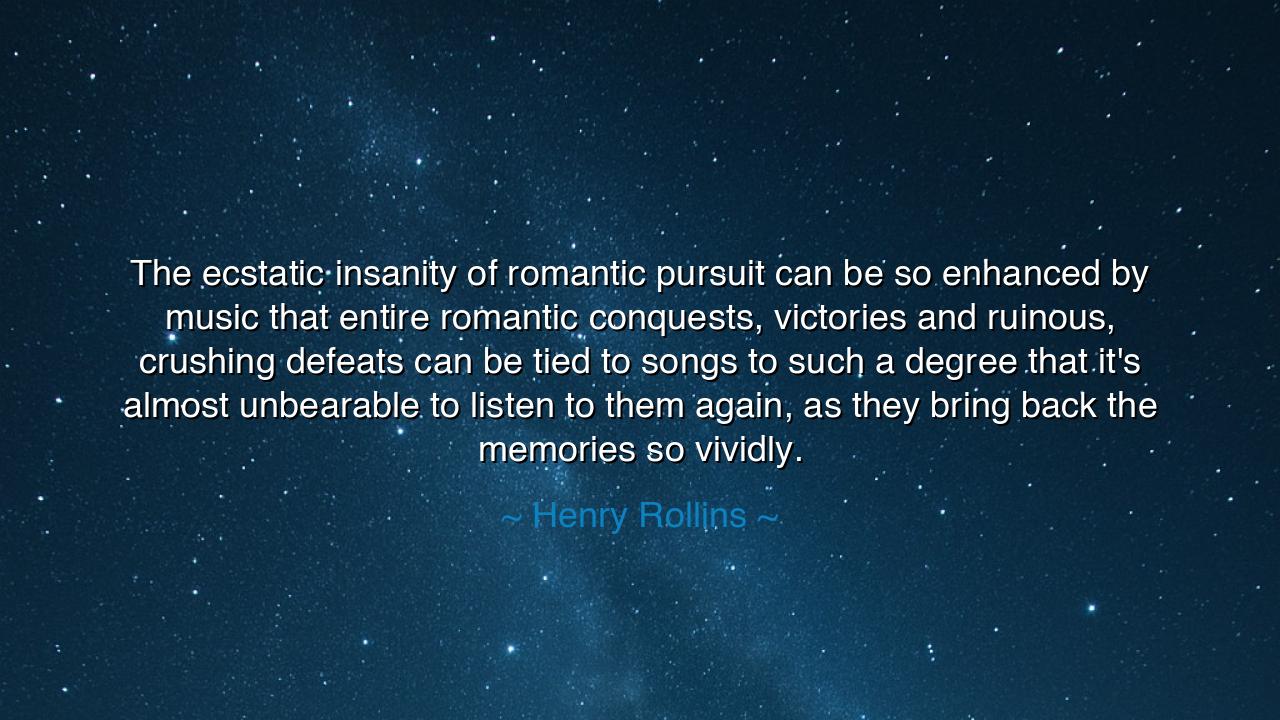
The ecstatic insanity of romantic pursuit can be so enhanced by
The ecstatic insanity of romantic pursuit can be so enhanced by music that entire romantic conquests, victories and ruinous, crushing defeats can be tied to songs to such a degree that it's almost unbearable to listen to them again, as they bring back the memories so vividly.






In the words of Henry Rollins, a man of fire and iron, there is revealed a truth that shakes both heart and memory: “The ecstatic insanity of romantic pursuit can be so enhanced by music that entire conquests, victories, and ruinous, crushing defeats can be tied to songs to such a degree that it’s almost unbearable to listen to them again, as they bring back the memories so vividly.” These words speak of the dangerous alchemy between passion and melody, between desire and sound, where love’s triumphs and devastations are engraved forever in the echoes of song.
The ancients knew well that music was no neutral art. They spoke of Orpheus, whose lyre could tame beasts, charm gods, and summon tears from the stoniest hearts. In his songs, grief for Eurydice lived on; in his melodies, desire found its immortal form. Rollins names the same truth: that romantic pursuit, already an ecstatic insanity, becomes more potent when entwined with music. For a song can freeze a moment in time—making a kiss eternal, or a heartbreak everlasting.
Who among us has not felt this binding? A melody played during a first embrace, a song drifting from a café when eyes first met, a ballad that happened to rise as a relationship crumbled—all of these become scars or jewels upon the soul. To hear them again is to be transported, not by choice but by force, into the furnace of memory. The music does not merely remind; it resurrects. Thus, Rollins is right: the power of song makes even the strongest tremble, for it brings back not only images, but the very pulse of emotions once thought buried.
History itself bears witness. Napoleon, mighty conqueror of Europe, was said to weep when hearing certain arias that reminded him of Josephine. Though he commanded armies, though he reshaped nations, the sound of a song tied to love could undo him. And what of soldiers in every age, who marched into war with songs of home and lovers echoing in their ears? For some, those melodies carried hope; for others, they carried despair. Songs are never only songs—they are vessels, carrying within them both victories and crushing defeats of the heart.
The deeper meaning is this: music binds emotion to memory more strongly than any other art. Words may fade, faces may blur, but the sound of a song can rip open time and place, bringing both rapture and agony with perfect clarity. Love itself is fleeting, but music ensures its ghost never dies. To love with a song is to invite eternity—sometimes sweet, sometimes unbearable.
The lesson is clear: we must treat music with reverence, for it is both medicine and poison. Choose your songs wisely in love, for they may become chains upon your soul. When you are joyous, let music elevate you, but know it will one day remind you of that joy with piercing sharpness. When you are grieving, take solace in music, but know it may reopen wounds with equal strength. Handle it as the ancients handled fire: as a force divine, capable of both light and destruction.
Therefore, O listener, embrace the power of song, but be mindful of its eternal bond with memory. Do not flee from the songs that bring pain, for they also remind you that you have lived, that you have dared the ecstatic insanity of love. Do not cling only to those that soothe, for life is richer when both joy and sorrow are remembered. For in the end, music is the witness of your heart’s battles, carrying forward your romantic conquests, your victories, and your defeats, so that you may walk wiser, braver, and more alive.






AAdministratorAdministrator
Welcome, honored guests. Please leave a comment, we will respond soon